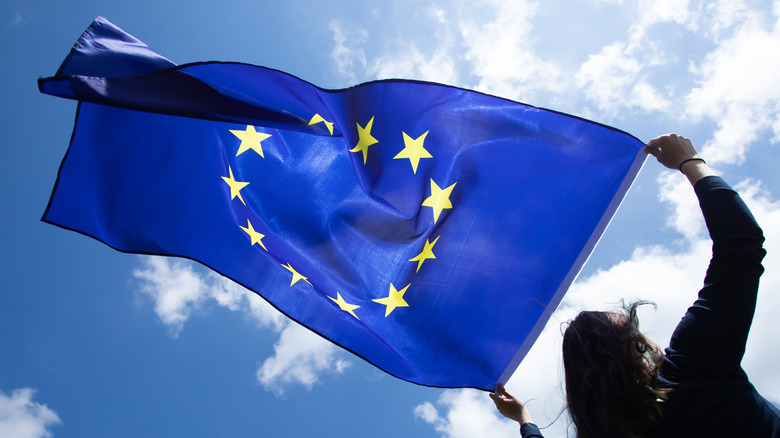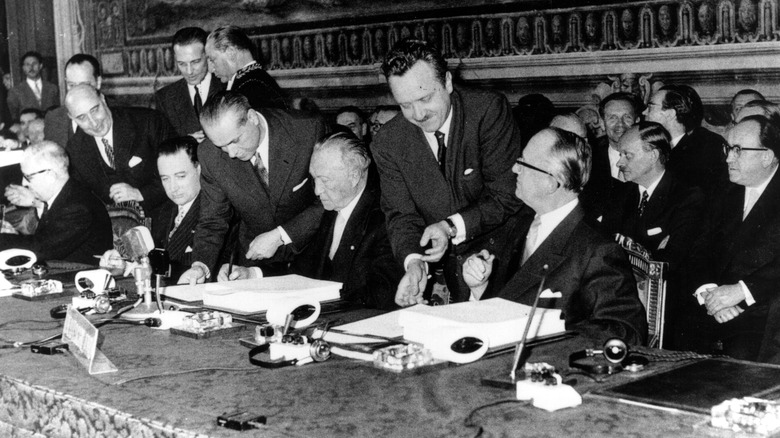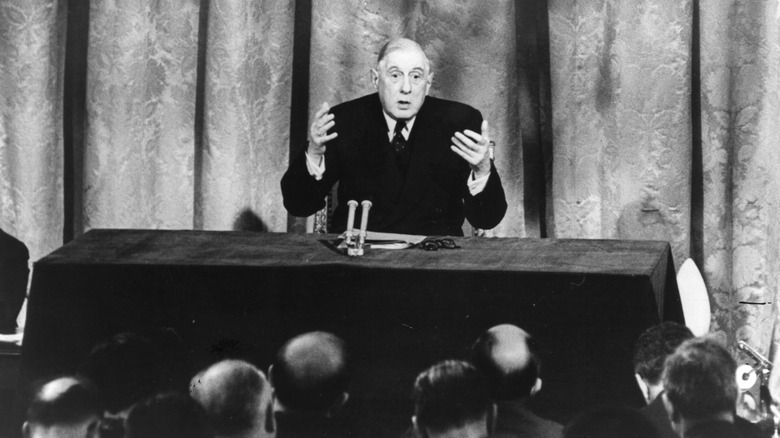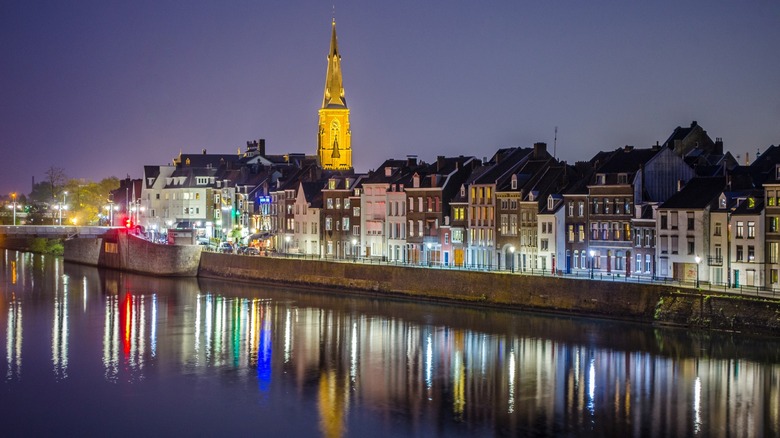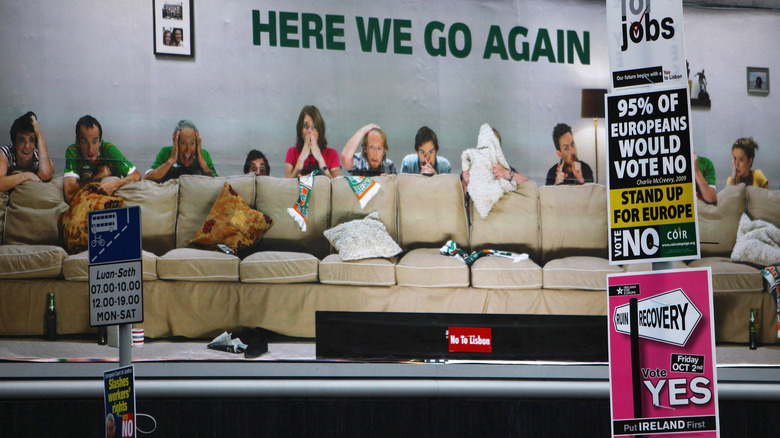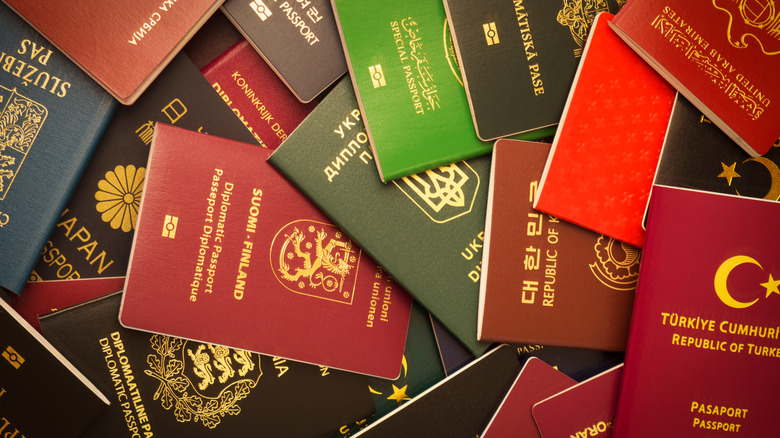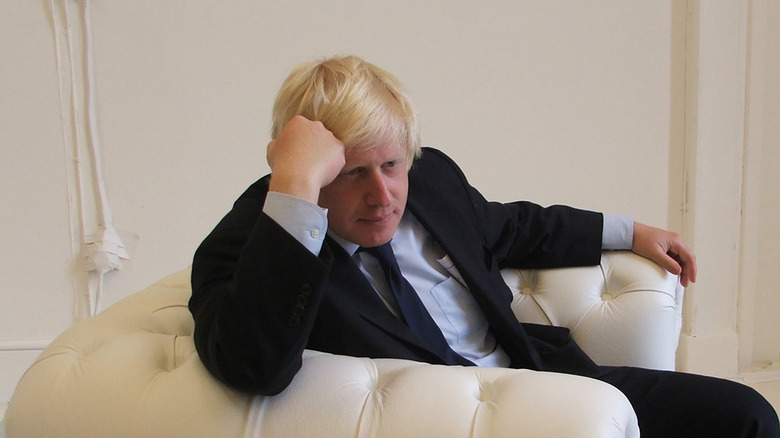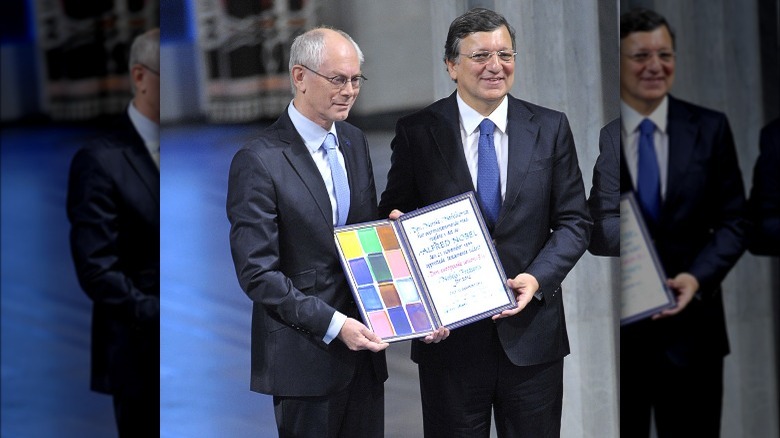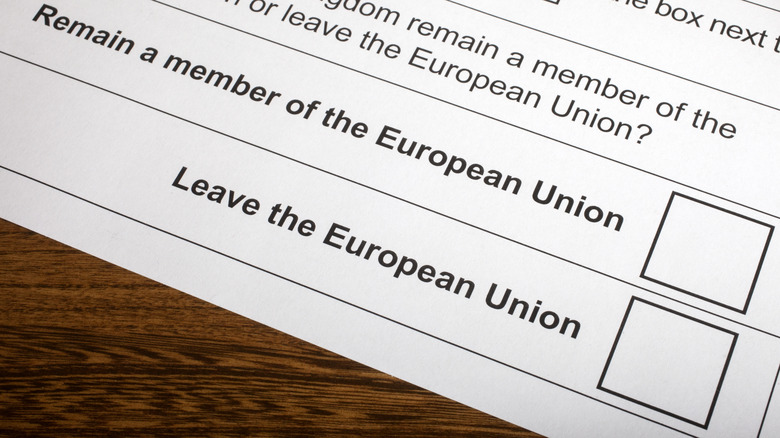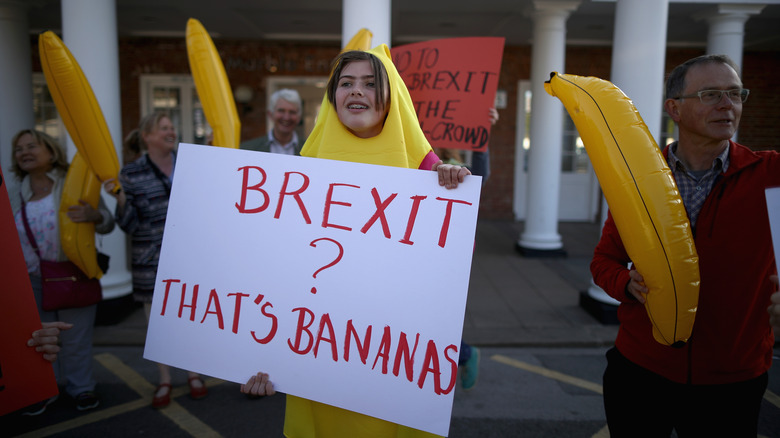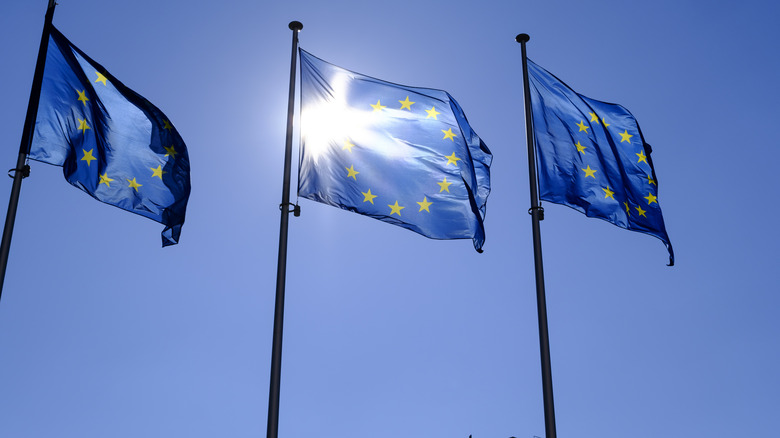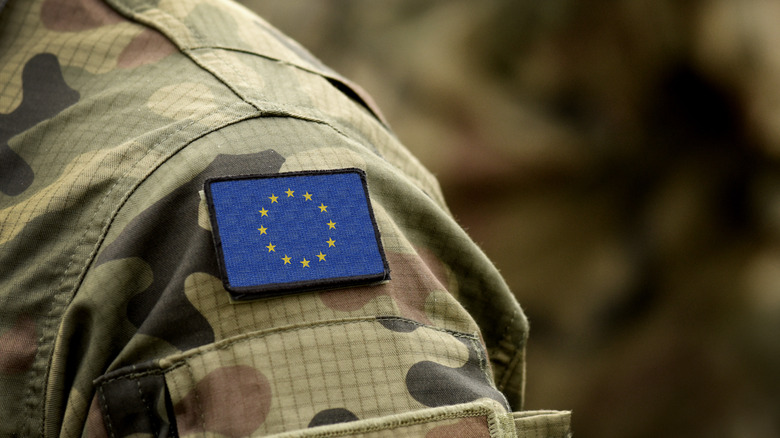The Untold Truth Of The European Union
In the aftermath of World War II, Europe was a continent in ruin, having served as the battlefield for the deadliest conflict in human history for six devastating years. With millions of people having lost their lives, those that remained found their livelihoods decimated, with the threat of yet more war seemingly always on the horizon amid the emergence of two great new superpowers: the U.S. and the USSR, whose rivalry threatened to play out across the continent (via CVCE).
Fast forward to today, however, and vast swathes of previously warring Europe are unified by a common cause: The European Union, an entity comprising 27 member states that has been praised for maintaining peace for generations on an otherwise unstable continent, but which nevertheless remains highly controversial. Many great political figures have praised the Union as an ongoing peace project, while others deride it as a failure, and seek to return Europe to a collection of loosely-associated member states. Here is the untold truth of the European Union, including surprising details from the distant past, some of the crises it has faced, and what may occur in the future.
The EU was originally only six countries
The roots of what we now call the European Union go back to two treaties signed between just six countries – Belgium, France, Italy, Luxembourg, the Netherlands, and West Germany – back in 1957, when the continent was still reeling from the effects of World War II. The Treaties of Rome brought together the countries' steel, coal, and atomic energy interests under the oversight of shared independent bodies, and cut back on the outdated bureaucracy that created friction in trade between the six countries, establishing what was initially called the European Economic Community, a.k.a. the EEC (via Britannica).
As Britannica notes, the surprisingly rapid establishment of the EEC among countries that had just recently been at war with each other came about with the intention of minimizing the chance of any future war between France and West Germany – that such conflict would be unthinkable today is testament to the clarity of the founding members' original vision.
However, per History, the EEC was also established as a result of the sense that Western Europe was struggling to compete with the superpowers on either side of it: to the west, the United States, whose intervention in the continent had been decisive to the defeat of Nazi Germany, but in the wake of war represented an enormous, fast-growing economy that had no trouble outcompeting the smaller, fractured European countries in world trade. To the east, the Soviet Union was industrializing rapidly under the leadership of Nikita Khrushchev, following the death of Joseph Stalin in 1953.
The UK was denied entry – twice
The European Economic Community wasn't the only trading group established in Europe in the post-war years. In 1960, the U.K., Norway, Denmark, Austria, Portugal, Sweden, and Switzerland formed the European Free Trade Association (EFTA), which was established with goals parallel to those of the EEC. The division between the two groups was, in part, geographic, with the EEC known as the "inner six" and the EFTA the "outer seven."
But History reports that as time passed, the EEC experienced a period of sustained growth that vastly outstripped the economic performance of the EFTA. As a result, the U.K. started lobbying for membership in the more successful common market but was rejected twice, having their membership vetoed on both occasions by the French President Charles de Gaulle (pictured).
De Gaulle was concerned that the U.K. would compromise the EEC by acting as "American agents" within the common market, according to the BBC, with their close alliance to the U.S. having a negative effect on the market's ability to compete economically. He blocked their membership in 1963 and 1967. They only joined in 1973, after de Gaulle's death, along with Ireland and Denmark, with Greece, Portugal, and Spain to join in the years that followed, along with East Germany in 1990 after the fall of the Berlin Wall.
The EU wasn't established until 1992
Following the reunification of Germany, the stage was set for a greater degree of cooperation between the trading partners that made up the EEC. What resulted was the Treaty on European Union, more commonly known as the Maastricht Treaty after the city in the Netherlands in which it was signed on February 7, 1992 (via Britannica). The Maastricht Treaty introduced a slew of new policies to affect greater European integration, including the concept of European citizenship and freedom of movement between member states, a collective approach to foreign policy and greater shared security protocols, and a greater degree of shared laws and lawmaking powers which would be executed through a common executive, among countless other innovations, per the European Central Bank.
"The negotiations leading to the Maastricht Treaty took place in an atmosphere of optimism and even euphoria. In fact, the critical voices that were loudest during that phase were directed against the alleged lack of ambition of the negotiators," claims former Director-General at the EU Council Jim Cloos, per the same source.
But almost instantly, the Union was plunged into crisis, when the reactions of numerous countries highlighted the difficulty of achieving consensus among such a large collective. With the treaty stating that it had to be ratified by all members of the European Community, it hit a number of potential roadblocks, including the rejection of the treaty in a referendum put to the people of Denmark, although the decision was later reversed, with political friction also being felt in France and the U.K. (via Britannica).
The EU grew too big too fast
After Maastricht, the European Union continued to grow, with Sweden, Austria, and Finland officially becoming members on New Year's Day 1995; 10 further countries – Cyprus, the Czech Republic, Estonia, Hungary, Latvia, Lithuania, Malta, Poland, Slovakia, and Slovenia – joined in 2004; and finally, Bulgaria and Romania were admitted in 2007 (via Britannica).
Such fast expansion of course is a testament to the economic success that countries within the EU were seen to have enjoyed as a result of their membership. But as the EU grew, the sheer number of members it represented and the need to fairly balance power between larger and smaller countries proved unwieldy, as was seen when the 2008 Lisbon Treaty – which had been put forward to "streamline" operations within the EU – hit several snags. These included redrafts having to be made on behalf of new members such as Poland, and the final document – which had to be ratified by each member state – being rejected by the people of Ireland in a referendum (via Britannica). At the time, the Irish economy was growing rapidly, so much so that it attracted a nickname: the "Celtic Tiger" (via JSTOR). But as Britannica notes, in the same year that Ireland voted down the Lisbon Treaty, the economy suffered a major downturn; 18 months later Irish voters passed the treaty, with integration crucial to their nation's fiscal recovery.
The Lisbon Treaty then ran into further complications when the Czech president Václav Klaus took the document – which had been approved by the Czech Parliament – to his nation's Constitutional Court to ensure that it did not endanger Czech sovereignty, before finally agreeing to sign. After years of drafting and wrangling, the Lisbon Treaty was at last enacted on December 1, 2009.
Iceland and other countries have yet to join
Such crises as those surrounding the Lisbon Treaty have led many political commentators to suggest that the European Union has simply grown too large to effectively share power and to fulfill its executive functions in a way that fairly reflects the individual interests of its individual members.
However, several countries remain candidates for joining the EU, most notably Turkey, whose application has been in the works for several decades, though has been hamstrung by several factors, according to Britannica, including anxieties among member states of Turkey's Islamic culture, and criticisms of policies that are in conflict with the EU's mandate to promote human rights. The official website of the European Commission describes Turkey as a "key strategic partner of the EU on issues such as migration, security, counter-terrorism, and the economy," but finds inconsistencies between the country's approach to "democracy, rule of law, and fundamental rights" and those of the Union.
Albania, Serbia, Macedonia, and Montenegro are all currently classed as candidates to join the EU. Iceland decided to delay its application to join but is part of the EEA (European Economic Area) and already enjoys some benefits. Switzerland, on the other hand, voted against joining the EEA, and in 2021 formally ceased all negotiations with the EU, having found itself in a position of long-term political and economic stability.
Fear of the EU's power led to 'Euromyths'
The integration of so many member states has meant the implementation of countless policies and directives to fulfill the goal of creating a level playing field across the European Union. However, the citizens of many member states have felt uncomfortable with the idea of the EU executive seemingly "telling them what to do" ... despite such directives coming from their own representatives.
Such anxieties have given rise to – and, subsequently, been fueled by – the "Euromyth," outrageous, absurd, and easily debunked reports of how the EU hoped to meddle in everyday life. Per The Guardian, such myths included the belief that the EU wanted to ban bagpipes, that they were planning a directive preventing children from blowing up balloons, and that "bendy" bananas would be unsellable. "It is absolutely crazy that the EU is telling us what shape our bananas have got to be," said the future Prime Minister of the United Kingdom, Boris Johnson (pictured), in 2016 (via NPR). Before he was in government, Johnson was a sensationalist columnist for the British tabloid The Daily Telegraph, a source of a great many of the Euromyths that have gone into circulation. Johnson himself has admitted that his "most joyous hours" came when writing "foam-flecked hymns of hate to the latest Euro-infamy" – whether true or not – and he personally has been identified as the original author of many of the Euromyths which still persist.
According to The Guardian, Euromyths were once becoming so prevalent that the EU launched its own website through which to debunk sensationalized claims of Brussels' overzealous policymaking, which at one point addressed more than 650 unfounded criticisms.
The EU won the Nobel Peace Prize
While the European Union has attracted many critics over the years, it has also attracted some notable admirers, including The Nobel Committee in Stockholm, Sweden, which in 2012 awarded the EU as an entity the Nobel Peace Prize.
The prize had been regularly awarded to organizations rather than simply individuals throughout its history – past recipients include the United Nations and UNICEF – but nevertheless, the selection raised eyebrows, with some critics arguing that the awarding of the Nobel Peace Prize to the EU was wrong.
However, the Nobel Committee was forthright in its reasoning, stating that the EU had "contributed to the advancement of peace and reconciliation, democracy, and human rights in Europe ... The Norwegian Nobel Committee wishes to focus on what it sees as the EU's most important result: the successful struggle for peace and reconciliation and for democracy and human rights. The stabilizing part played by the EU has helped to transform most of Europe from a continent of war to a continent of peace." With such sentiments, the Nobel Committee reinforced the idea that the EU's raison d'etre is not simply economic, but rather that it is vital in protecting the security of more than 450 million people across the continent.
Brexit was a threat to the EU
It is impossible to talk about the European Union without mentioning one of the most fervently discussed and analyzed political upheavals of the last quarter-century: Brexit. On June 23, 2016, the people of the U.K. voted by referendum to leave the EU. The vote was won by the tightest of margins: 51.9% voted "leave," while 48.1% voted to "remain," from an electoral turnout of 72.2% (via the BBC). Per The Guardian, the U.K. and EU had always been an awkward fit, with the U.K.'s position as an island cut off from the rest of Europe, and whereas continental countries have borne the brunt of the region's 20th-century conflicts that made cooperation paramount to securing ongoing peace, the U.K.'s attitude was arguably one of "exceptionalism."
The referendum was first announced in 2013 by the Conservative British Prime Minister David Cameron, a step which the BBC suggests was taken as a result of the Conservative party losing voters to the fervently Eurosceptic U.K. Independence Party. Notably, Cameron went on to campaign for the U.K. to remain in the EU, having successfully won a referendum on Scottish independence from the U.K. in 2014 with a 10% margin. The Guardian claims that the "leave" side was buoyed by a "largely populist, emotive, and evidence-free campaign" which ultimately chimed with Eurosceptic Britons on a "range of factors" to achieve the result.
Upon the results being announced, many Europhiles were concerned that other disgruntled member states would follow in the footsteps of the U.K. and seek to leave the EU as well.
Brexit ended up being a disaster for the UK
In the run-up to the Brexit referendum, much of the rhetoric around the "leave" campaign centered around the U.K. being able to reclaim sovereignty that it had lost to the European Union during its years of membership; that the country would finally have greater freedom as a trading power operating as a single entity. As The Guardian notes, the "leave" campaign's slogan, "Take back control," was highly effective in suggesting the greater autonomy the U.K. would enjoy outside of the EU.
However, what British politicians attempting to deliver a form of Brexit that resembled what the "leave" campaign had promised discovered was that a nation cannot exist in a vacuum; the first priority after passing legislation formally putting Brexit into motion would be to renegotiate a trade deal with the European partners on Britain's doorstep – and any deal the U.K. could broker would, by definition, have to offer fewer perks than those the nation enjoyed as a full member of the EU, a point signaled by numerous European leaders, per D.W. The U.K. also ran into a major obstacle in terms of how to manage the border between Northern Ireland and the Republic of Ireland, which until Brexit had been frictionless for years, with both countries enjoying freedom of movement as fellow EU members (per The Guardian).
After years of wrangling, the U.K. finally left the EU officially on February 1, 2020, though amid the chaos of their departure, it appears that Europeans in the majority of member states have enjoyed a renewed appreciation of EU membership, per the Pew Research Center.
The stars on the EU flag do not represent countries
Just like a regular nation, the European Union has an anthem: the prelude to Ludwig van Beethoven's "Ode to Joy," taken from the German composer's 9th Symphony (per the Council of Europe). Per the CVCE, the EU also has its own motto: "United in diversity," which reflects the Union's aim of "forg[ing] a common destiny" despite cultural disparity and historical differences. And, of course, the EU also has its own flag.
The EU flag is instantly recognizable: a circle of 12 yellow stars – often described in the Union's official documents as "golden" stars – arranged in a circle on a blue background. In the wake of Brexit, it was common in Europe to see t-shirts, hoodies, and posters featuring the EU flag with a star conspicuously absent, and, indeed, many people did believe that the flag would have to be redesigned to reflect the U.K.'s departure. But as Snopes notes, no redesign was required.
Though the flag has 12 stars, they do not represent individual member states, as is commonly assumed. According to the EU website, 12 was chosen as the "symbol of perfection" when the flag was designed in 1955. Even accounting for the loss of the U.K., the 12 stars would fall way short of representing the 27 countries of which the EU is currently comprised.
The EU might get its own army
In 2019, The New York Times reported that German and Dutch troops were doing something which had never been tried in the history of Europe: operating as a single integrated unit. Tank Battalion 414, the report says, was created using German tanks and Dutch radios, and commanded in English, with troops of both nations riding together under common command. The establishment of a European army is, for some, ideological: a final piece in securing lasting unity across the continent. But the move is also pragmatic: the same source reports that European military commanders had been reminded of the continent's dependence on American support in providing security, at a time when some of the Union's largest countries, such as Germany, had been seen to be underspending on defense.
Nevertheless, such military integration remains political kryptonite in many European countries, being symbolic in many member states of a final capitulation to Brussels and synonymous with the relinquishment of national sovereignty – a sticking point, historically, for many Eurosceptics. As The New York Times reports, few European politicians are willing to openly lend their support to the creation of a European army, though world events may mean that behind closed doors military experts are taking this old idea more seriously than ever before.
The first steps towards a united European army began with joint operations between German and Dutch troops in 2019, though whether it will become a full-scale reality is not yet clear, with much opposition to the plan both inside and outside of the EU.
